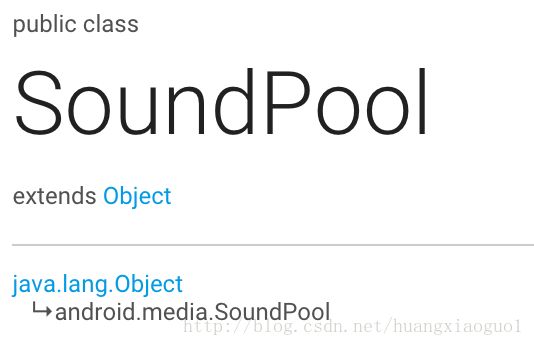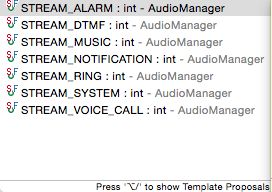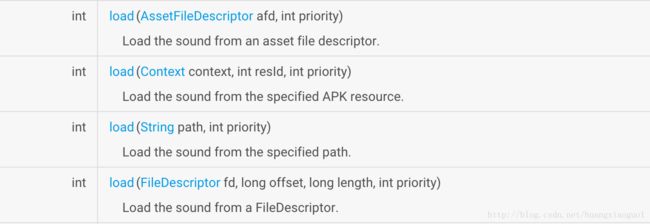Android 音频播放之SoundPool的使用和封装(自定义声音资源)
例如,现在在一个五子棋游戏中,我们需要在棋子落盘的时候播放一段声音。我们可以利用SoundPool,因为它时间很短,而且需要反复播放,并且我们不希望声音占用太大资源。
一般大家使用的是MediaPlayer来播放音频,它的创建和销毁都是非常消耗资源的,如果我们的需求是播放一些短促而且频繁播放的音频的话MediaPlayer就有些不合适了,我们来讲讲SoundPool来播放短促的音频:
SoundPool结构如下:
初始化SoundPool
初始化SoundPool 我们直接new SoundPool (int maxStreams, int streamType, int srcQuality)即可
参数解释:
重要方法
加载音频
在load方法中我们一般是把音频文件放到res的raw文件夹下,然后使用load(Context context, int resId, int priority)方法来加载音频到SoundPool中:
播放音频比较简单,使用play(int soundID, float leftVolume, float rightVolume, int priority, int loop, float rate)
参数解释:
第一小结
**总结一下播放一个音频的所需代码如下:**
//初始化SoundPool
private SoundPool soundPool= newSoundPool(10,AudioManager.STREAM_SYSTEM,5);
//加载deep 音频文件
soundPool.load(this,R.raw.deep,1);
//播放deep
soundPool.play(1,1, 1, 0, 0, 1);
封装
如果我们在很多Activity中都要用到音频文件,比如给所有点击操作加上音效,那么我们每个Activity都要new ,然后load,在play,这样做是非常繁琐而且混乱的,那么我们做如下的分装:
/**
*
* @author zsl
* @blog http://blog.csdn.net/yy1300326388
*
*/
public class SoundPlayUtils {
// SoundPool对象
public static SoundPool mSoundPlayer = new SoundPool(10,
AudioManager.STREAM_SYSTEM, 5);
public static SoundPlayUtils soundPlayUtils;
// 上下文
static Context mContext;
/**
* 初始化
*
* @param context
*/
public static SoundPlayUtils init(Context context) {
if (soundPlayUtils == null) {
soundPlayUtils = new SoundPlayUtils();
}
// 初始化声音
mContext = context;
mSoundPlayer.load(mContext, R.raw.beng, 1);// 1
mSoundPlayer.load(mContext, R.raw.click, 1);// 2
mSoundPlayer.load(mContext, R.raw.diang, 1);// 3
mSoundPlayer.load(mContext, R.raw.ding, 1);// 4
mSoundPlayer.load(mContext, R.raw.gone, 1);// 5
mSoundPlayer.load(mContext, R.raw.popup, 1);// 6
mSoundPlayer.load(mContext, R.raw.water, 1);// 7
mSoundPlayer.load(mContext, R.raw.ying, 1);// 8
return soundPlayUtils;
}
/**
* 播放声音
*
* @param soundID
*/
public static void play(int soundID) {
mSoundPlayer.play(soundID, 1, 1, 0, 0, 1);
}
}
我们先把所有的文件都加载起来,用的时候直接查询看一下它是第几个加载的,然后直接调用play方法即可:
使用
第一步:在程序入口的Activity的onCreate方法中添加如下代码:
//初始化音效
SoundPlayUtils.init(this);
第二步:在任何地方播放时,直接使用如下代码:
播放beng
//播放声音
SoundPlayUtils.play(1);
播放water
//播放声音
SoundPlayUtils.play(7);
转载地址:http://blog.csdn.net/yy1300326388/article/details/47044869






